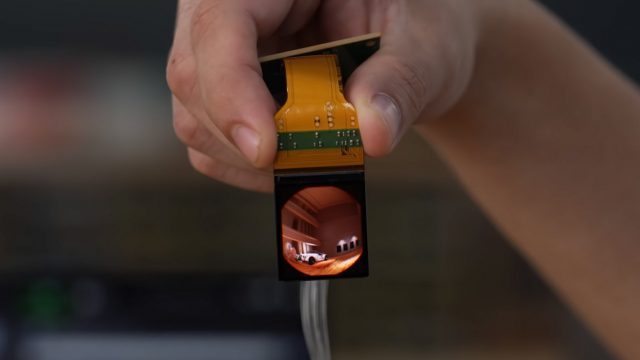During an online showcase today, Sony revealed a VR headset prototype with a 4K OLED microdisplay. While it appears to be a wholly different project than the upcoming PSVR 2, the company says it expects the display itself to be “used in the entertainment field,” which could include other VR headsets.
Today during the Sony Technology Day showcase the company highlighted new technology from across its various businesses.
During the event the Sony Group R&D Center revealed a VR headset prototype which employs a 4K OLED microdisplay. The headset is shown connected to a PC and uses a hand-held form-factor rather than a headstrap. The prototype appears to only support rotation tracking for the time being.
The headset’s 4K OLED microdisplay is ostensibly Sony-made. It’s not only significantly higher resolution than what was in the original PSVR headset, (roughly 1MP vs. 16MP per-eye) it’s also much more compact. The exact specifications weren’t given but a 1-inch² size was suggested.
While the original PSVR used a single large display that spanned both eyes, the display shown in the prototype headset has a nearly square form-factor which makes it better for VR headsets since one display can be used for each eye (which improves design flexibility and pixel utilization).


Although the new display is more compact, it’s appears to be so small that zooming and focusing the image for an immersive field-of-view would necessitate more advanced optics than what’s in most consumer VR headsets today. Doing so could lead to a rather compact headset, though the presentation doesn’t offer a clear sense of the headset’s fundamental size, nor what kind of optics are used.
The prototype headset appears to be a totally different project than what Sony’s PlayStation group is working on with the upcoming PSVR 2, however it’s an intriguing possibility that PSVR 2 might make use of the same displays.
Although Sony is in the display business, the original PSVR actually used a Samsung-made OLED display. While many first-gen VR headsets similarly used OLED displays, second-gen headsets have largely moved to LCD for improvements in price, resolution, and brightness, at the cost of the rich colors and dark blacks that OLED displays are known for.
Sony has yet to release its second-gen headset and at this point it’s unclear if it will continue to opt for OLED in the next PSVR headset or move to LCD like most of its peers; rumors suggest it will be OLED, but possibly made by Samsung once again.
For Sony’s part, however, the company says it expects its 4K OLED microdisplay will be used in “industrial applications” as well as the “entertainment field.” This suggests that if PSVR 2 doesn’t use the display, we might ironically see it in other non-Sony VR headsets. The size suggests it might be best fit for compact VR headsets like Vive Flow.


